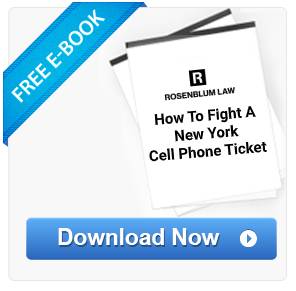What Is the Cost of a Cell Phone Ticket in New York?
Fines: A conviction for a cell phone ticket in New York State costs $50 to $150 for a first offense. A second offense in 18 months costs between $50 and $200. A third offense in 18 months can cost between $50 and $450.
Surcharges: All cell phone/texting tickets in New York include a $88 or $93 surcharge depending on where the driver was ticketed. This is in addition to the fine.
Driver Responsibility Assessment Fee (DRA): Drivers who accrue six or more points in 18 months as a result of traffic convictions will be required to pay an additional fine known as the Driver Responsibility Assessment fee (DRA). This penalty costs $300 plus $75 for each point after six. This fee is paid to DMV and is separate from and in addition to the state surcharges and fines associated with the ticket.
Points: Drivers convicted of a cell phone or texting violation in New York will have 5 points assessed on their license per violation.
Auto insurance premium increase: Insurance companies periodically pull the driving records of their customers and can increase rates when new convictions appear. Cell phone/texting tickets are high-point tickets, and insurance companies do not take them lightly. One study showed a single cell phone ticket can cause a rate increase of 20 percent.
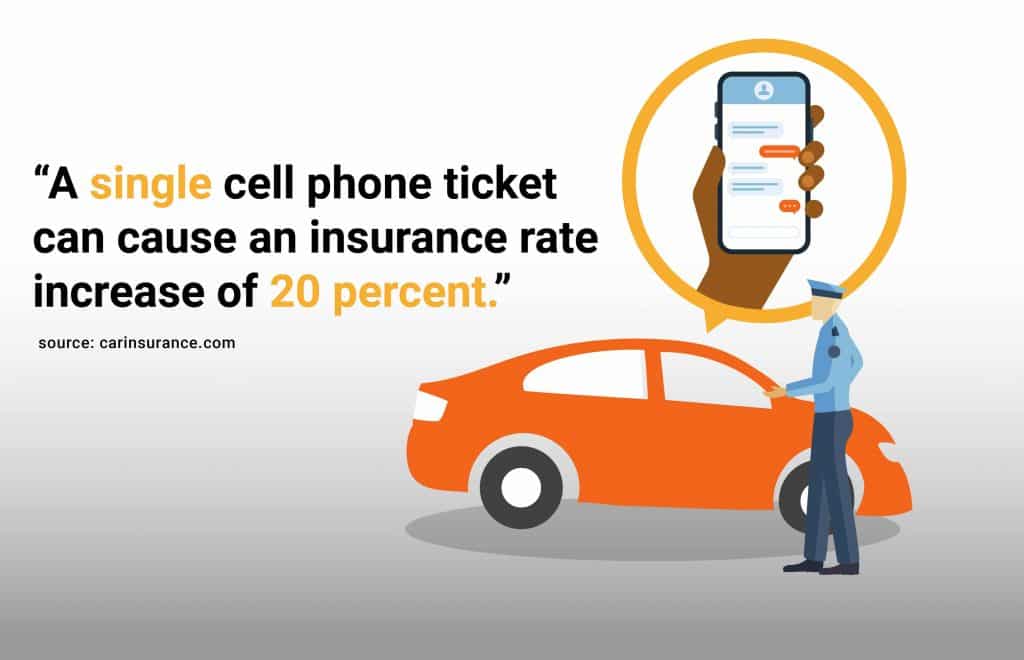
Notice: A single cell phone ticket carries 5 points, which is almost half the amount needed to have one’s license suspended.
Types of Cell Phone Tickets
New York’s Vehicle and Traffic Law (VTL) contains two distinct laws related to use of portable electronic devices while driving:
- VTL 1225(c) Use of Mobile Telephone
- VTL 1225(d) Use of Portable Electronic Devices (includes texting while driving)
A ticket for VTL 1225(c) is entirely different from a VTL 1225(d) ticket: 1225(c) is a cell phone ticket (“c” for cell phone) while 1225(d) is an electronic device ticket (“d” for device), more commonly known as a texting while driving ticket (even though it covers more than texting).
A 1225(c) ticket means the officer is claiming that the driver was engaged in a phone call at the time he observed him/her. For 1225(d) tickets, it is irrelevant whether the driver was making a phone call. A driver who is holding their phone while texting or using an app (including GPS navigation) can be issued a 1225(d) ticket.
What many people don’t realize is that a 1225(d) ticket can also be given for devices other than phones. A portable GPS system (i.e. Garmin), MP3 player, iPad, camera, or other hand-held electronic device also counts under the 1225(d) law.
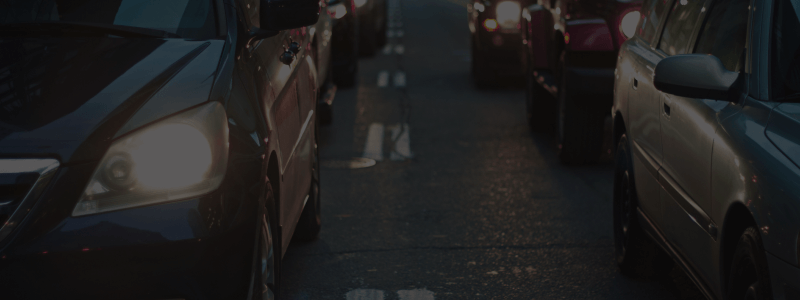
Need help with your cell phone ticket?
Call Now - We've Fought Over 100,000 Traffic Violations
Quick, free, and no obligation.
Hiring an Attorney to Fight a New York Cell Phone Ticket
Between fines, surcharges, and insurance increases, a conviction for a cell phone or texting ticket in New York can cost hundreds and even thousands of dollars. That’s why hiring a lawyer to get the ticket reduced or dismissed will undoubtedly save you money. In many jurisdictions, an attorney can reduce a cell phone or texting ticket to a non-moving violation such as a parking ticket or plea it down to a lesser-point ticket such as disobeyed traffic control device (a two-point violation). This can reduce or eliminate the impact on one’s driving record and insurance rates. While plea bargains (point reduction via negotiation) are not allowed in New York City, they are permitted in all other New York courts. Read our guide to Fighting a NYC Cell Phone Ticket here.
Drivers who hire a lawyer can rest easy. Once hired, a lawyer can take over the case, doing all the research and paperwork, as well as appear in court on the driver’s behalf.
Other Types of Distracted Driving
Using a cell phone while driving is just one of many forms of distracted driving. Other forms of distracted driving are:
- Eating and drinking
- Personal grooming
- Adjusting the navigation or other systems
- Tending to others in the vehicle
Using a cell phone or texting while driving are unique in that they are the only forms of distracted driving that are defined as separate civil offenses punishable regardless of whether or not the offending driver causes injury to another. Virtually every other form of distracted driving is punished only when the driver’s inattention to the road causes another’s injuries, in which case the punishment usually involves holding the distracted driver liable for the resulting damage.
Fighting a Cell Phone Ticket in NYC vs. Other Locations
The first difference between fighting a cell phone ticket issued in New York City versus one issued in a different location is this: a New York City cell phone ticket will be fought in an administrative proceeding at the Traffic Violations Bureau (a division of the NYS Department of Motor Vehicles), while a cell phone ticket issued in a different location in New York will be fought in court.
Did you
know?


Kent Ng
As one of the busiest cities in the world, New York City sees an incredible volume of traffic tickets issued. To avoid being overwhelmed by this increased volume, the New York DMV established the Traffic Violations Bureau, or “TVB.” The TVB handles traffic tickets issued in the five boroughs of New York City. Tickets issued elsewhere in New York are handled primarily by the courts. Yet, regardless of where in New York a traffic ticket is issued, it arises from New York’s Vehicle and Traffic Law. What does all this mean for drivers hoping to fight a cell phone ticket?
Whether one’s cell phone ticket is fought in a TVB hearing or in court can have huge implications for their case. One reason is that the burden of proof is much lower in a TVB hearing than in a court of law. This means it takes less evidence to convict someone of a cell phone violation in a TVB hearing than in a court of law. A TVB hearing also has no opportunity for plea bargaining, which is when one pleads guilty to a less severe offense than what they were charged with in exchange for lesser penalties. This is in stark contrast to when a traffic ticket is handled in court, in which case plea bargaining is possible.
When a traffic ticket is issued in New York City, the stakes are even higher, making it even more vital to contact an experienced attorney to ensure the very best possible outcome.
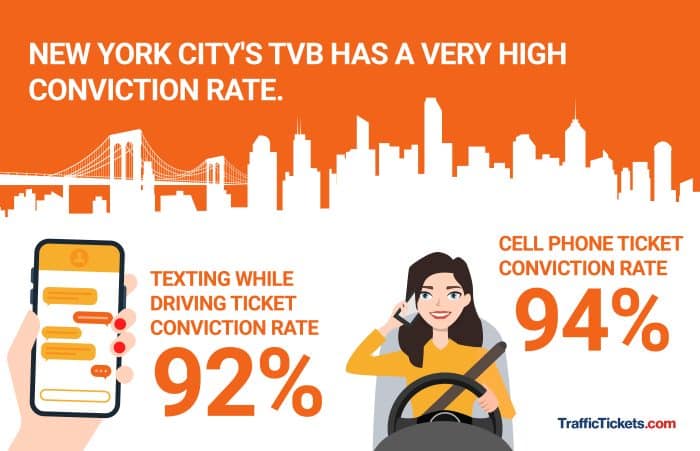
Cell Phone Tickets Given to Junior Drivers
Junior drivers are subject to stricter penalties for using a cell phone or texting while driving. A first violation of New York’s cell phone driving laws by a driver with a Class DJ or MJ driver license or learner permit results in suspension of the driver’s license or learner permit for 120 days. If convicted a second time within six months of their license being restored after a first conviction, their license will be revoked for at least one year.
Cell Phone Tickets Given to CDL Drivers
Commercial drivers are also subject to much tighter regulations for cell phone use while driving. Commercial truck driving regulations are twofold. Commercial truck drivers are subject to state-level regulations, which are just the ordinary traffic laws, and federal regulation by the Federal Motor Carrier Safety Administration (FMCSA).
One way in which New York’s state law treats commercial truck drivers differently in the cell phone ticket context is that unlike ordinary drivers, commercial drivers are not permitted to use their mobile devices while their vehicles are temporarily stationary because of traffic, a traffic light, or other momentary delays. New York law further provides that for CDL drivers, a mobile telephone is no longer a hands-free device when the driver presses more than one button to dial or answer the phone. CDL drivers are also deemed to be using their mobile telephones when they are
“...holding a mobile telephone to, or in the immediate proximity of, the user's ear, or dialing or answering a mobile telephone by pressing more than a single button, or reaching for a mobile telephone in a manner that requires such person to maneuver so that he or she is no longer in a seated driving position.”
whereas non-CDL drivers are only using their mobile telephones within the meaning of the law when they hold the telephone to their ear.
Unlike ordinary drivers, commercial drivers are not permitted to use their mobile devices while their vehicles are temporarily stationary because of traffic, a traffic light, or other momentary delays.
FMCSA regulations of cell phone use while driving mostly mirror New York’s policies. One difference is the penalties for cell phone use while driving. While on the state law level, CDL drivers are subject to the same penalties as non-commercial drivers for a cell phone ticket, the FMCSA imposes additional penalties, including:
- A civil penalty not to exceed $5,833
- If a second cell phone ticket conviction occurs within a three-year period of the first conviction, then disqualification from driving a commercial vehicle for 60 days
- If a third or subsequent cell phone ticket conviction occurs within a three-year period of prior convictions, then disqualification from driving a commercial vehicle for 120 days
Are There Any Exceptions to the Law?
New York’s cell phone ticket laws have a multitude of built-in exceptions providing circumstances where cell phone use or texting while driving are permissible. These exceptions include the following:
- Engaging in a call does not include holding a mobile telephone to activate, deactivate or initiate a function of such telephone
- Commercial drivers are not operating a commercial motor vehicle while talking on the phone or while operating a portable electronic device when such vehicle is stopped at the side of, or off, a public highway in a location where such vehicle is not otherwise prohibited from stopping by law
- The use of a mobile telephone for the sole purpose of communicating with any of the following regarding an emergency situation:
- an emergency response operator
- a hospital, physician's office, or health clinic
- an ambulance company or corps
- a fire department, district, or company
- a police department
- The use of a mobile telephone by the following persons while in the performance of their official duties:
- a police officer or peace officer
- a member of a fire department, district, or company
- the operator of an authorized emergency vehicle
- The use of a hands-free mobile telephone
Important: A person can legally use a cell phone while driving in emergency situations to communicate with a hospital, the fire department, or the police.
Out-of-State Drivers
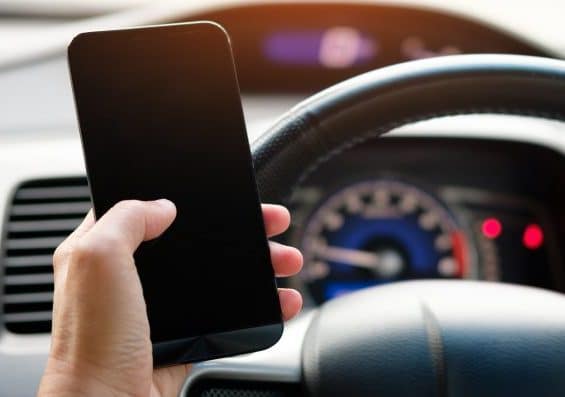
Drivers licensed outside New York sometimes mistakenly believe they can ignore a New York cell phone or texting ticket. This would be a huge mistake. New York State can suspend someone’s right to drive within its borders for failing to respond to or pay a cell phone/texting ticket issued here. Unfortunately, a driver who pays a New York cell phone or texting ticket may still have to deal with points, insurance increases and fines associated with a conviction. New York is also likely to inform the home state of a driver of any convictions, which means those convictions are almost assured to end up on a person’s driving record and can therefore impact their auto insurance
Each state handles a New York traffic ticket conviction differently. Read more here
New Jersey
The New Jersey Motor Vehicle Commission normally assesses two points on a New Jersey license following a moving violation conviction in New York. In the case of cell phone or texting tickets, New Jersey does not assess points until the third conviction. These points count towards suspension of both New York and New Jersey driving privileges. Read More
Connecticut
Drivers from Connecticut will not receive points from the Connecticut DMV following a cell phone or texting conviction in New York. However, the five points New York assigns to the violation will be noted by the New York DMV and can still result in a suspension of driving privileges in New York. Read More
Florida
The Sunshine State will assess points for out-of-state convictions. In Florida, talking on a cell phone is not considered an offense but texting while driving is. Thus, a Florida driver convicted of texting in New York will get six points on their license. Read More
Other states – Drivers licensed in any of the other 50 states and D.C. can find more information about New York speeding tickets by visiting our out-of-state license page.
How to Fight a New York Cell Phone/Texting Ticket
There are several strategies that can be used to fight a cell phone or texting ticket - some more effective than others:
- Take the Cell Phone/Texting Ticket to Trial and Be Found "Not Guilty" by the Judge. Every driver has the right to due process. But taking a cell phone or texting ticket to trial is risky—a driver who is found guilty at trial will see the conviction on their driving record and have five points assessed against his/her license. This can be a long shot. If the facts are unclear, the judge will almost side with the officer by default. This is why if your case is likely to end up going to trial you need an experienced lawyer who knows how to navigate the playing field.
- Schedule for Trial and Hope the Officer Doesn’t Show. Many drivers believe that if the officer does not appear for the trial, the judge will dismiss the case. While a driver can ask the judge to dismiss the case, it is far more likely he/she will simply reschedule the trial for a different date. And if they do show up eventually (the more likely scenario) there’s a good chance you will be convicted, especially if you don’t know what you’re doing.
- Make a Motion to Dismiss the Cell Phone/Texting Ticket. This is a good choice if there are valid grounds for a dismissal. For example, depending on the jurisdiction there is certain information that, if missing or erroneous, would invalidate the ticket. To see whether or not your ticket can be dismissed on technical grounds it is best to have it reviewed by an experienced attorney.
- Have an Attorney Negotiate a Reduction of the Cell Phone/Texting Ticket. It is usually possible for a skilled attorney to negotiate the ticket down to a lower offense. In this case, the driver would pay a fine but receive less points. A reduced charge is less likely to impact one’s insurance premiums (saving hundreds of dollars in the long run) and mitigate or eliminate the risk of a suspended license.
Key Takeaways
- New York City has some of the highest conviction rates for cell phone/texting tickets in the state.
- Even if someone doesn’t live in New York State, a New York cell phone ticket can still appear on his/her driving record.
- An out-of-state driver convicted of a New York cell phone ticket may still have points assessed on his or her license, depending on what state they are licensed in.
- Failing or refusing to pay a New York cell phone ticket can result in an out-of-state driver having his/her license suspended by their home state.
For more information
- How to Beat a Cell Phone Ticket in New York
- Five Winning Arguments For Fighting a Cell Phone Ticket in New York § 1225(d)
- Five Winning Arguments For Fighting a Cell Phone Ticket in New York § 1225(c)
- New York Cell Phone & Texting Ticket Data
Common Questions
- How Long Does a Cell Phone or Texting Ticket Stay on Your Driving Record?
A cell phone or texting violation will stay on one’s driving record until January 1 of the fourth year following the date of conviction. The five points associated with the ticket will count towards one’s point total for 18 months from the date of the violation.
For example, if a cell phone ticket is issued in December 2017 and the driver is convicted in court in March 2018, then the points will count until June 2019 and the conviction will remain on the record until January 2022.
- Is Talking on Speakerphone a Cell Phone Violation in New York?
A motorist who talking via speakerphone but still has the phone in hand can still be ticketed for a cell phone violation. Officers will not typically stop a motorist if he or she believes a person is talking on a hands-free speakerphone, as this is fully legal.
- Can I Hold an Electronic Device Other Than a Cell Phone While Driving?
NYS VTL 1225(d) makes it illegal to use any electronic device while driving. This includes a GPS, iPad, or camera. For GPS systems (or phones with GPS apps), the exception is if they are mounted in the vehicle and not held in the driver’s hand.
- Is It Legal to Drive with Earbuds in My Ears?
New York’s cell phone and texting laws do not cover earphone use. However, a separate statute—VTL 375-24-a—makes it expressly illegal for a driver (or cyclist) to have two earphones plugged in. This a no-point violation with a maximum fine of $150, but is avoidable by keeping at least one ear free to able to hear traffic noises while driving.
- Is it Legal to Use Your Cell Phone at a Red Light or Stop Sign in New York?
The statute for cell phone use and texting explicitly states that the vehicle must be in motion to constitute a violation. However, it is generally accepted that the vehicle is considered “in motion” when it is being operated which includes being stopped at a stoplight or stop sign.
Data on New York Cell Phone/Texting Tickets
Despite its steady decrease, cell phone-related traffic violations remain a concern, according to the data from the Institute for Traffic Safety Management & Research. Over the years, there has been a significant decline over a span of nearly a decade, with the number of cell phone tickets dropping from 164,008 in 2014 to 36,937 in 2023. On the other hand, the number of texting tickets have begun to increase after the pandemic, reaching 73,568 in 2023. This suggests that texting while driving remains a persistent issue in New York State despite the significant attention from law enforcement.

The NYPD still remained the top law enforcement agency that issued the most cell phone and texting tickets. Among the counties, Kings had the most number of cell phone and texting violators at 19,119 tickets when combined.
Most drivers were ticketed during the weekdays in 2023, most especially on Wednesdays (20%), Tuesdays (18.7%), and Thursdays (18%). A similar midweek pattern holds true for texting tickets that year. In terms of time of day, most cell phone and texting tickets were written between 9 am to 6 pm.
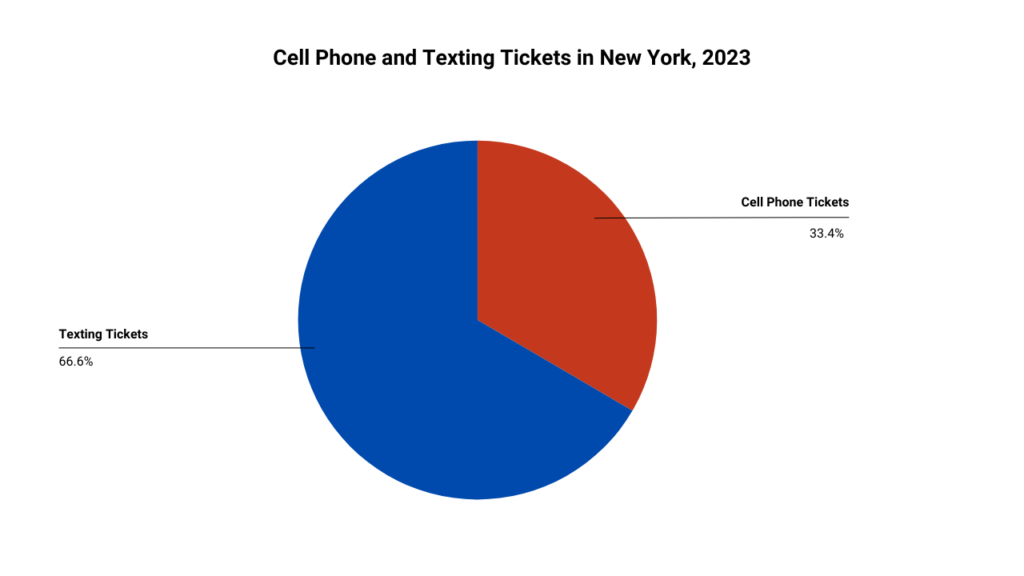
Since New York is a heavily populated area, the NYPD was responsible for giving out 48.3% of all texting tickets and 40.9% of all cell phone tickets in 2023. Other local law enforcement agencies, such as the state and county police, also handed out the rest of the traffic tickets to drivers.


